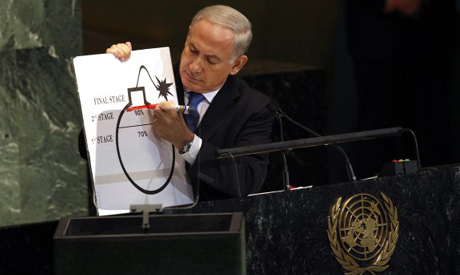James Bennet, Capricia Marshall and Peter Betz are our guests this week.
Show produced by Katherine Caperton.
Original Air Date: September 29, 2012 on SiriusXM “POTUS” Channel 124.
Polioptics airs regularly on POTUS on Saturdays at 6 am, 12 noon and 6 pm.
Follow us on Twitter @Polioptics Listen to the show by clicking on the bar above.
Show also available for download on Apple iTunes by clicking here.
 The United Nations General Assembly (UNGA) this week in New York, combined with the Clinton Global Initiative and other events that capitalize on the presence of world leaders on U.S. shores, lived up to its billing again as a major challenge to the 201-year-old grid system of Manhattan streets.
The United Nations General Assembly (UNGA) this week in New York, combined with the Clinton Global Initiative and other events that capitalize on the presence of world leaders on U.S. shores, lived up to its billing again as a major challenge to the 201-year-old grid system of Manhattan streets.
But we survived, thanks to the efficiency of the New York City Subway system and, from a Polioptics perspective, Israeli Prime Minister Benjamin Netanyahu thrived, thanks to his bold use of a Congressional-style prop that elevated his “red line” regarding Iranian nuclear capability to the vaunted above-the-fold position in the world’s leading newspapers.
* * *
This seemed a perfect week to check in with a woman I’ve known for 20 years, Ambassador Capricia Marshall, the U.S. Chief of Protocol and an icon for advance people of both parties. Capricia has been camped out in New York this week with her team from the State Department’s Office of Protocol to help the representatives of the 193 member nations navigate from event to event with minimum discomfort and maximum American hospitality, or the best approximation of which New York City can muster.

Ambassador Capricia Marshall, U.S. Chief of Protocol
If there was a Hall of Fame of Advance People, I would nominate as its first inductees Jim King, the great Kennedy advance man; Mike Deaver, Ronald Reagan’s Deputy Chief of Staff; and Capricia Marshall, the youngest ever White House Social Secretary (at age 32).
Capricia was never an advance person per se, but her stellar 20-year career working closely with Hillary Clinton (as Arkansas First Lady, as U.S. First Lady, as U.S. Senator, as presidential candidate and as U.S. Secretary of State) has been built on the sterling good judgement to know how much or how little ceremony, pomp and circumstance any principal can tolerate and deal diplomatically with all sides to make them feel good about an event’s outcome. On many occasions during our years at the White House, Capricia would delicately steer me aside and help me edit a grand vision into something that the Clintons would feel comfortable with but still achieve a goal of quality coverage. That, in essence, is the mission of a great advance person, and Capricia equals it on all counts.
Some good background reading on Capricia here and here.
As you’ll appreciate by listening to our conversation with Capricia, protocol encompasses far more than showing a dignitary to their assigned toe mark or seat. Indeed, upon her confirmation by the U.S. Senate, Capricia set about reshaping the Office of Protocol under Secretary Clinton to make Foggy Bottom and other places where America welcomes its esteemed guests in to warm and inviting surroundings where the art of diplomacy can be more genially conducted. One of those initiatives is the Diplomatic Culinary Partnership, launched on September 7, which creates, among other things, the American Chef Corps.
The Chef Corps, which as of now includes about 80 of America’s most accomplished captains of the kitchen, are now emissaries for one area of American culture that has reached high art at home but can use some burnishing overseas: food.
Cable news has had some fun this week calling out one chain for some delicacies that probably won’t sell well in the Continental U.S. but which they hope will find footing in other continents, such as the Cone Crust Pizza, unveiled this week by Pizza Hut Middle East. Enter the Chef Corps, whose duties will include preparing meals for visiting heads of state, government and royalty and exporting the best of American culinary culture when traveling overseas.

The American Chef Corps gather at the State Department for the Sept. 7 launch of the Diplomatic Culinary Partnership
As Secretary Clinton herself said in a video message at the roll-out of the Diplomatic Culinary Partnership:
“Food isn’t traditionally thought of as a diplomatic tool, but I think it’s the oldest diplomatic tool. Sharing a meal can help people transcend boundaries and build bridges in a way that nothing else can.”
To help demonstrate the point, Capricia brought with her a special guest, Peter Betz, to our taping at SiriusXM studios at Jazz at Lincoln Center located at the Time Warner Center on Columbus Circle. Peter, also a member of the American Chef Corps, serves as Executive Sous-Chef of the Waldorf Astoria Hotel in Manhattan, the center of the action for all things culinary during UNGA Week.
We engaged Peter in a wide ranging conversation about what makes his kitchen tick during the frenzy of UNGA and how he keeps cool under pressure even when his cauldrons boil over. While Peter wouldn’t give many any more scoop about the secret railroad spur beneath the Waldof built for President Franklin Roosevelt that is the stuff of urban legend, he did wax enthusiastically about the expansive beehives he has constructed 20 floors above Park Avenue that supply the hotel’s honey needs.
In a world where U.S. culinary culture has become too well known for our golden arches, Kentucky Colonels and Starbucks siren, Peter and his cuisine, along with his fellow chefs in the American Chef Corps, are now doing their part to bring our rich export of exquisite food overseas.
Some more background reading on the Diplomatic Culinary Partnership and the American Chef Corps here, here and here.
* * *
There’s been widespread lament this election cycle about the role of money in politics, but too often our collective attention deficit prevents us from diving too deeply into the issue. We get away at cocktail parties by bemoaning Super-PACs and the influence of, on one side, the Koch Brothers or, on the other side, George Soros, and leave it at that, content to nibble on the canapes provided by one political interest or another.
Even at one of America’s great long-form magazines, The Atlantic, the challenge to reporters of rolling up their sleeves and peeling back the layers of one of the nation’s most complex and thorny issues might seem too big a story to swallow, especially with so much else happening on the campaign trail.
Sometimes, the editor-in-chief himself has to put down his red pen and pick up his reporter’s notebook and pencil and pursue the story on his own. And that’s exactly what James Bennet of The Atlantic has done with his 10,000 word piece, “The New Price of American Politics,” which is now online and on newsstands.
The story is a fascinating journey into the world of James Bopp, Jr. of Terre Haute, Indiana, and Trevor Potter of Washington, D.C., both Republican lawyers who, for the past ten years and beyond, have led opposing forces into battle over the role of money in politics.

James Bennet of The Atlantic
It takes a writer of Bennet’s skill to ferret out the reasoned arguments on both sides. James covered the Clinton White House for the New York Times when we worked there, and then took on the assignment of Jerusalem Bureau Chief for the paper. When Atlantic owner David Bradley initiated his top-to-bottom makeover of the magazine in 2006, he brought Bennet back from Israel to steer the ship. The results, across the broad array of print and digital platforms, have been astounding.
But the most astounding thing of all may be how Bennet has managed to make the issue of campaign finance clear, fair and interesting.
He got some help along the way. Stephen Colbert and the staff of the Colbert Report on Comedy Central helped to put money in politics on mainstream television against a backdrop of satire that puts our system as it currently operates into sharp focus. Their coverage won the show a Peabody Award earlier this year, and fresh installments of Colbert’s ongoing dialogue with his Super-PAC attorney, Trevor Potter, always enliven the show. Grab a taste at this link or by click on the photo of Colbert and Potter at their Congressional testimony.
 Thanks all. We’ll catch up again next week with another episode of Polioptics.
Thanks all. We’ll catch up again next week with another episode of Polioptics.


Leave a Reply